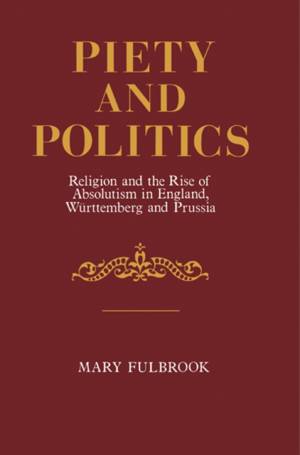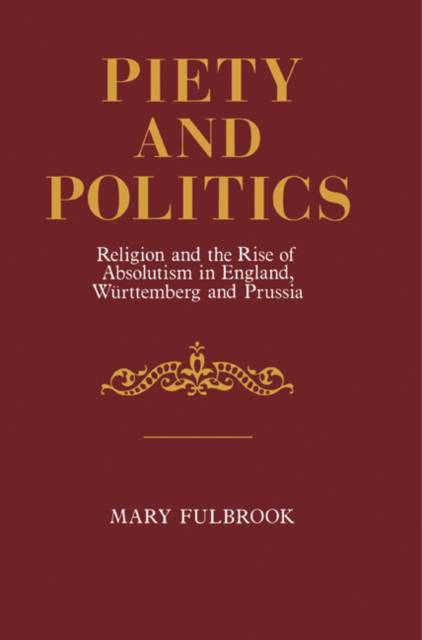
Je cadeautjes zeker op tijd in huis hebben voor de feestdagen? Kom langs in onze winkels en vind het perfecte geschenk!
- Afhalen na 1 uur in een winkel met voorraad
- Gratis thuislevering in België vanaf € 30
- Ruim aanbod met 7 miljoen producten
Je cadeautjes zeker op tijd in huis hebben voor de feestdagen? Kom langs in onze winkels en vind het perfecte geschenk!
- Afhalen na 1 uur in een winkel met voorraad
- Gratis thuislevering in België vanaf € 30
- Ruim aanbod met 7 miljoen producten
Zoeken
Piety and Politics
Religion and the Rise of Absolutism in England, Wurttemberg and Prussia
Mary Fulbrook
€ 72,45
+ 144 punten
Omschrijving
In the context of continuing debates over Protestantism, capitalism and the absolutist state, this book presents a fresh historical and theoretical analysis of religion and politics in early modern Europe. The author undertakes a systematic comparative-historical analysis of the very different contributions made by the Puritan and Pietist movements to the success or failure of absolutist rule in England, Württemberg and Prussia. While Puritans and Pietists shared similar religious ideas, aspirations and ethos, they developed quite different political attitudes and alliances in each case. English Puritans made a crucial contribution to the overthrow of attempted absolutism, as the English Revolution helped ensure the further development of parliamentary rule. Pietists in Württemberg shared the anti-absolutist attitudes of the English Puritans, yet tended to remain politically passive in the constitutional struggles against absolutism. And in complete contrast, Pietists in Prussia made a vital positive contribution to the successful establishment of the militaristic, bureaucratic Prussian absolutist state.
Specificaties
Betrokkenen
- Auteur(s):
- Uitgeverij:
Inhoud
- Aantal bladzijden:
- 224
- Taal:
- Engels
- Reeks:
Eigenschappen
- Productcode (EAN):
- 9780521276337
- Verschijningsdatum:
- 17/11/1983
- Uitvoering:
- Paperback
- Formaat:
- Trade paperback (VS)
- Afmetingen:
- 152 mm x 229 mm
- Gewicht:
- 335 g

Alleen bij Standaard Boekhandel
+ 144 punten op je klantenkaart van Standaard Boekhandel
Beoordelingen
We publiceren alleen reviews die voldoen aan de voorwaarden voor reviews. Bekijk onze voorwaarden voor reviews.









